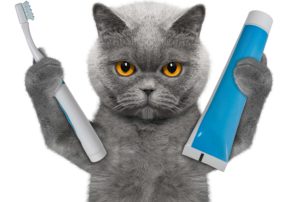Dogs, cats and other companion animals and rarely show signs of dental pain. This is a survival mechanism, an instinctual behavior that our domesticated animals have in common with their wild ancestors.
Your pets can’t tell you when they’re suffering from a toothache or other types of pain. However there are signs that we can look out for that will give an indication that they may be in pain.
A bad smell is a byproduct of the bacterial metabolic process. In pets with serious gum disease, there is more bacteria in the mouth, and so the odour increases. “Doggy breath” or “tuna breath” is not normal and needs to be checked out and evaluated.
If you notice any of these signs, contact your veterinarian to schedule an exam.
Obvious signs of dental pain :
●chewing on one side of the mouth ●dropping food ●running away from the food dish ●crying when yawning ●hiding away ●not grooming themselves ●acting “grumpy” ●low appetite – going off food
You know your pet better than anyone, so look out for any abnormal behaviours.
Bleeding from the mouth is usually due to periodontal disease, but it could also be evidence of:
fractured teeth ●lacerations ●or ulcers on the tongue ●or gum tissue ●or the presence of an oral mass
Look for thick, ropey saliva, spots of blood found on toys or beds or drops of blood in the water or food dish.
If the periodontal disease is severe enough, you may notice bleeding from the nose or bloody discharge when your pet sneezes.
Once the veterinary team addresses your pet’s oral issues, your pooch may show he is feeling better by acting like a puppy again or your kitty might seek extra attention.
Please don’t let your pets suffer in silence. They don’t just have a toothache, they have a whole mouth full of toothaches. Another thing to note is that gum disease can also lead to other problems with your pet’s body affecting their liver and heart.
Did you know that 4 out of 5 dogs over the age of 3 years have some sort of serious gum disease? It can be caused by the buildup of plaque, so it’s important to go in for regular dental checkups and cleanings.
But wait, there is good news! Remember that daily dental hygiene is FREE. All you need is a toothbrush and a couple of minutes to help prevent periodontal disease.
So if you have a young pup, make sure you brush their teeth daily, have their teeth cleaned at the vet regularly and keep an eye on their diet.
Don’t let your pets suffer in silence. They don’t just have a toothache, they have a whole mouth full of toothaches.






